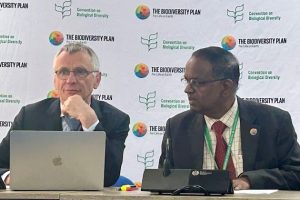
BY ZEKARIAS WOLDEMARIAM
It has been about a year since the much African Continental Free Trade Area (AfCFTA) entered in to implementation. 40 member states have also ratified the agreement eve since which demonstrates the high commitment of the countries for the regional economic integration that is believed to bring about various benefits to the continent.
The secretariat also says there are some important and milestone progresses made so far that push forward the continental market. In his brief stay with The Ethiopian Herald, AfCFTA Secretary General, Wakemele Mene has explained the major progresses as well as challenges to be faced normally by the integration process. Have a nice read!
Could you tell us about the major achievement of the AfCFTA secretariat since its maiden implementation?
First we have made significant progress in operationalization of the AfCFTA. We now have fully functional secretariat that has capable staff. But more important in the last 2 years the ministers of trade have been working very hard to establish the legal foundation for trading under AfCFTA. We now have the pillars that will constitute the AfCFTA. We have a protocol on trade and goods. We have a protocol on dispute settlements on trading services.
These are the required tools for ensuring that we have an agreement that is effective. We also have launched recently the pan Africa payment and settlement system which we are working on with Afrexim Bank and this is going to be a game changer. You will now be able to pay to trade in your local currency. To pay your counterpart in Ghana you will use Ethiopian birr, they will receive in Ghana local currency, Cidi.
The payments and settlement system is at the core of boosting inter Africa trade. We also are launching an AfCFTA adjustment fund, about 1 billion USD, which will help countries to adjust to implementation of the AfCFTA. Thirdly we have agreed last week 87.7 per cent rules of origin. 87.7 per cent products traded in Africa, the same local content rule will apply. This shows that we have certainty, predictability of market on our continent.
The secretariat has ratified 1 bln USD adjustment fund recently. What are the considerations you made in this regard?
Our estimates are that the adjustments fund will require between 7 to 8 billion USD over ten years to make sure that the countries who need assistance to implement the agreement that financial assistance is there. The initial amount that we have now on the table is 1 bln USD, to kick start. We will engage in mobilization strategy. But for now that we require is a billion USD.
What do you think would be the role fo the diaspora in the AfCFTA?
The diaspora is critical. Part of the adjustment fund, A pillar of the fund is where you will be able to invest and get returns on your own investment. It will be operated just like any other investment fund. Institutional investor, sophisticated investors and also individual investors can invest in the AfCFTA adjustment fund. We call it a credit fund and get returns on their investment. We will enter in to joint venture arrangement with AFrexim bank to make sure that the fund is properly managed. It is not going to be managed by the secretariat. It is not going to be managed by Afrexim bank. It will be managed by an investment management company. We believe that this tool of implementation of the AfCFTA is critical to success of the implementation of the agreement.
We will encourage when we engage in resources mobilization strategy. Part of that would be to invite the diaspora to invest in the fund. The fund is actually is not going to benefit governments. It is going to be directed to productive sector investment. Through government of course, but the beneficiaries are not going to be governments. The beneficiaries are going to be identify a particular industry in a country, let’s say textile and clothing or leather processing, this is what we foresee. So certainly the diaspora will be able to invest and they will have confidence that the investment would be managed properly by a qualified investment management agency.
How do you see the commitment of member states in the implementation of the AfCFTA agreement?
The commitment is there. We now have 40 countries that have ratified the agreement establishing the AfCFTA. That is a record number of ratifications that we have seen in AU. That demonstrates a very very … commitment. Ethiopia has ratified the agreement and Ethiopia is fully committed that it participates in the negotiation because Ethiopia understands there are a lot of benefits to Ethiopia in terms of export capacity. The market here is vibrant in the continent. Ethiopia has a lot to benefit in the services, in the area of air transport services where the continent is integrated and where barriers to itnerAfrica trade are reduced. I foresee that Ethiopia will significantly benefit in terms of being able to provide the connectivity that will be required to ensure that trade does happen.
What kinds of challenges do you expect countries would face in the course of the implementation of AfCFTA?
We must expect that there would be challenges. We must expect that some countries along the way will experience a macro economic imbalances, balance of payment crisis. These things will happen. Some countries will experience import surges, this is to be expected. But if you look at the expenses of other areas around the world that have achieved regional integration it took the EU 72 years to be where they are today.
There are challenges along the way. But the EU has now 70 per cent intra European trade. So it demonstrates and underscores the point that there are benefits to regional integration, even the smallest countries and the biggest countries can benefit in a bigger market. So I expect that we will have challenges but I believe that if we look at economic history and the history of regional economic integration we will see that the benefits far outweigh the challenges.
Thank you very much
Thank you
The Ethiopian Herald February 6/2022





